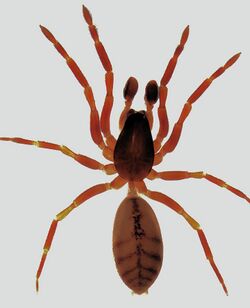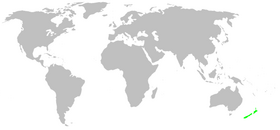Biology:Huttonia
| Huttonia | |
|---|---|

| |
| Huttonia sp. (male) | |
| Scientific classification | |
| Domain: | Eukaryota |
| Kingdom: | Animalia |
| Phylum: | Arthropoda |
| Subphylum: | Chelicerata |
| Class: | Arachnida |
| Order: | Araneae |
| Infraorder: | Araneomorphae |
| Family: | Huttoniidae Forster & Platnick, 1984 |
| Genus: | Huttonia O. Pickard-Cambridge, 1879[1] |
| Species: | H. palpimanoides
|
| Binomial name | |
| Huttonia palpimanoides O. Pickard-Cambridge, 1880
| |

| |
| Distribution (green; click to enlarge) | |
Huttoniidae is a family of ecribellate[2] araneomorph spiders containing a single genus, Huttonia, itself containing a single described species, Huttonia palpimanoides. It is known only from New Zealand.[1]
Very few specimens of the genus were known until it was discovered that they primarily inhabited dead fronds of rainforest ferns.[3]
Taxonomy
It was first described by Octavius Pickard-Cambridge in 1880.[4][1] Originally placed with the ant spiders, it was moved to a family of its own, Huttoniidae, in 1984, in the superfamily Palpimanoidea.[5]
Fossils of this family have been found in Cretaceous (Campanian) amber from Alberta and Manitoba, Canada . This extended the known geological age of the Huttoniidae back about 80 million years, supporting the theory of H. palpimanoides being an ousted relict species.[6] They are probably most closely related to the now extinct family, Spatiatoridae.
Although only one species is described, about twenty more undescribed species are thought to exist.[7]
References
- ↑ 1.0 1.1 1.2 Gen. Huttonia O. Pickard-Cambridge, 1879. Natural History Museum Bern. 2019. doi:10.24436/2. http://www.wsc.nmbe.ch/genus/1075. Retrieved 2019-06-11.
- ↑ Griswold, C.E. (1999). "Towards a Phylogeny of Entelegyne Spiders (Araneae, Araneomorphae, Entelegynae)". Journal of Arachnology 27: 53–63. http://www.americanarachnology.org/JoA_Congress/JoA_v27_n1/arac_27_01_0053.pdf.
- ↑ Platnick, Norman I., ed (2020). Spiders of the World: A Natural History. Princeton, NJ. p. 99. ISBN 9780691188850.
- ↑ Pickard-Cambridge, O. (1880). "On some new and rare spiders from New Zealand, with characters of four new genera.". Proceedings of the Zoological Society of London 47 (4, for 1879): 681–703. doi:10.1111/j.1096-3642.1879.tb02701.x. https://www.biodiversitylibrary.org/part/67264.
- ↑ Forster, R. R.; Platnick, N. I. (1984). "A review of the archaeid spiders and their relatives, with notes on the limits of the superfamily Palpimanoidea (Arachnida, Araneae)". Bulletin of the American Museum of Natural History 178: 87.
- ↑ Penney, D.; Selden, P.A. (2006). "First fossil Huttoniidae (Araneae), in Late Cretaceous Canadian Cedar and Grassy Lake ambers". Cretaceous Research 27: 442. doi:10.1016/j.cretres.2005.07.002.
- ↑ Forster, R.R.; Forster, L.M. (1999). Spiders of New Zealand and their Worldwide Kin.
External links
Wikidata ☰ {{{from}}} entry
 |

